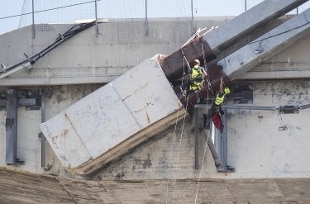- Ponte Morandi, Review: "No checks, Aspi wanted to avoid costly maintenance"
- Nexi flies, agreement voices with understanding. Down Atlantia for documents on the Morandi bridge
Share
by Tiziana Di Giovannandrea December 06, 2019For the Liguria TAR as established in the 'Genoa Decree', which later became the Genoa law, is based on faults that have not yet been proven and therefore decided to refer the question of Autostrade to the Constitutional Court against the decree that it ousted Aspi from the demolition and reconstruction of the new Morandi bridge.While awaiting the ruling of the Council, the Administrative Court of Liguria suspended the judgment on the appeal presented by Aspi aimed at obtaining the annulment of the legislative provision.
The judges find profiles of unconstitutionality, noting that a right emerges for Autostrade to comply with the provisions of the concession.
The decree, in fact, according to the Tar is based, as regards the cause of the collapse of the Ponte Morandi, on a responsibility of Aspi merely potential, because it is not ascertained, not even in a subtle way, and therefore the administrative courts have declared "relevant and the question of constitutional legitimacy is not manifestly groundless, pursuant to which in the grounds. "
The Tar of Liguria therefore considered the critical points of the decree highlighted by Aspi's lawyers to be founded.
The TAR has written that: "The exclusion from the relative activities, in a broad sense, to the demolition and reconstruction of the infrastructure, together with the imposition of large assets, established under the law, appear to configure, in fact, a restriction of freedom of economic initiative that, in the absence of prior assessments regarding the responsibility of the event, does not seem justified by the need to protect any interests of constitutional status ".
Therefore, the administrative judges continue: "Aspi is responsible for the event could not constitute justification of the law decree because it is an assessment that appears to have been adopted without procedural guarantees, without adequate investigation to bring out even only circumstantial elements of responsibility" .
"The absolute exclusion of Aspi from the execution of any activity, being based only on the" suspicion "of a possible responsibility of the concessionaire, violates the principle of proportionality and reasonableness".
Among the possible constitutional violations raised by Aspi's lawyers are those of equality before the law and free economic initiative.

